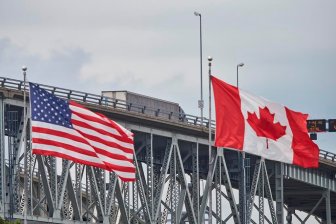A doctor from Toronto considered using shoelaces and scissors when she sprang into action to deliver a baby on board a flight to East Africa.
It happened on a Qatar Airways flight from Doha, Qatar to Entebbe, Uganda, where Dr. Aisha Khatib was travelling for work and medical training on Dec. 5.
About an hour into the journey, there was a call over the intercom for medical assistance in the economy cabin.
“I went over, and there’s this woman lying there with her head towards the aisle and her feet towards the window, and a baby was coming out,” Khatib told Global News.
Read more:
Alberta baby delivered in Balzac Fire Station: ‘It worked out perfect’
She sprang into action, along with a nurse and pediatrician who were among the passengers and crew on board.
“I need clamps, scissors, and if not clamps I need shoelaces,” Khatib recalled thinking.
“Luckily, there was a delivery kit in the medical kit so we were able to clamp and cut the umbilical cord.”
She remembers the tense moments leading up to the delivery, and then the wash of happiness and relief when the baby started crying.
“I said, ‘Congratulations, it’s a girl,’ and the entire plane started clapping,” said Khatib.
The overjoyed 25-year-old mother gave her newborn daughter a name: Miracle Aisha, named after the hero doctor who helped bring her into the world.
Aisha Khatib / Supplied.
Aisha Khatib / Supplied
“I had a little namesake necklace, an ‘Aisha’ necklace that I was wearing that I gave to her, so she knows where she came from,” an emotional Khatib said.
Khatib, a travel doctor with MedCan and assistant professor of family and community medicine at the University of Toronto, hadn’t delivered a baby in a decade.
“It’s like riding a bike, right?” she said, laughing.
Delivering a baby can be risky in any setting, but doing it tens of thousands of feet up in the air comes with its own complications.
“When you’re high up in altitude, you have to worry about lower oxygen pressures that can affect potentially baby in respiratory distress,” Khatib explained.
“There’s always risk of post-partum hemorrhage or bleed after the delivery. And if you don’t have blood products or anything to stabilize mom, that’s always a risk and that would be a major emergency.”

© 2022 Global News, a division of Corus Entertainment Inc.























Discussion about this post